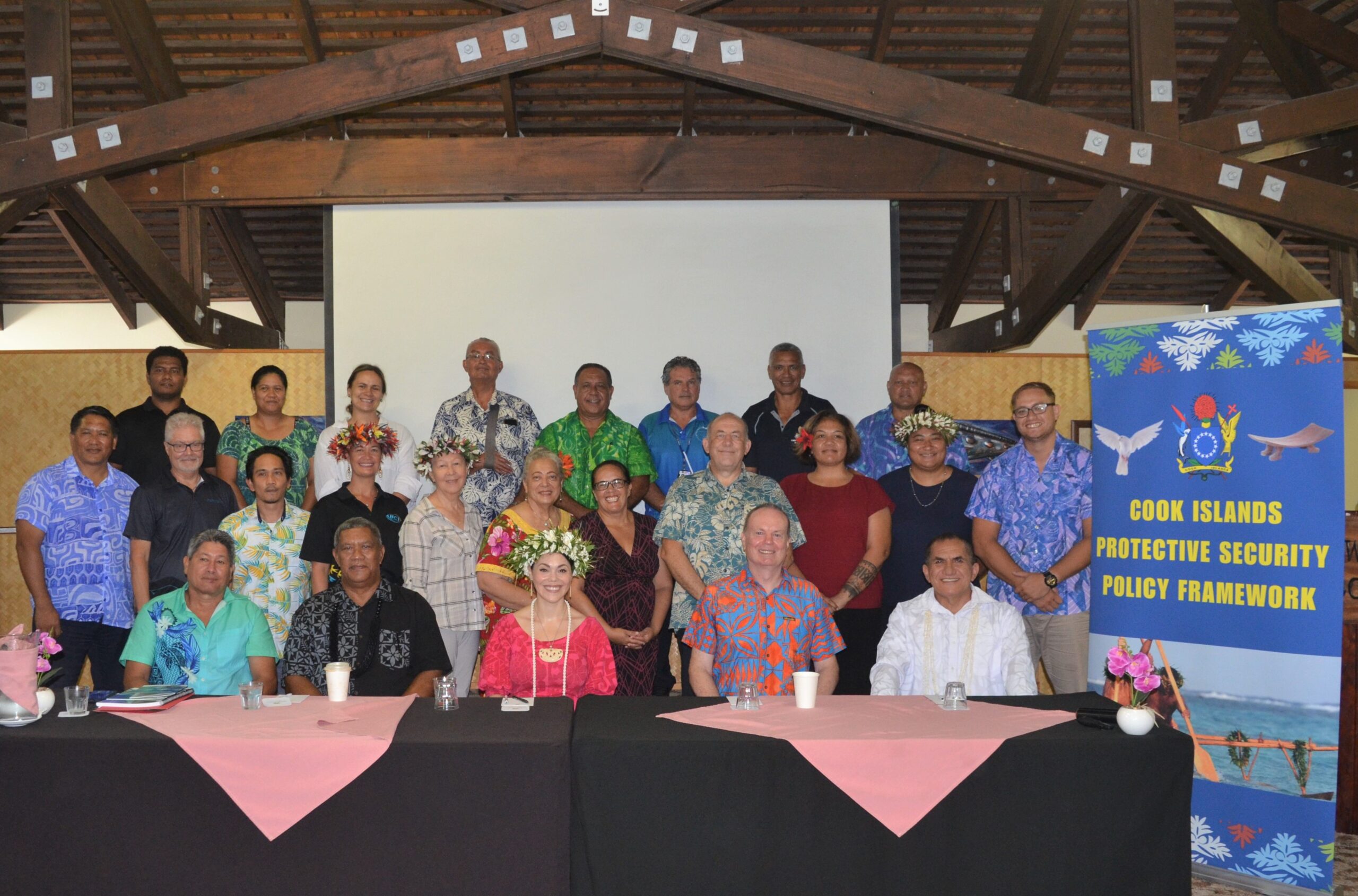Cook Islands enhances data security
Thursday 29 February 2024 | Written by Melina Etches | Published in National, Technology

The launch of the Protective Security Policy Framework at The Edgewater Resort, led by Tetava Maara Ariki (Maara Tetava), the national security director, assisted by Wayne Robati, the national security officer. MELINA ETCHES/24022711
For the first time, the Cook Islands has a new classification system for all government documents to better protect its own data and give confidence to colleagues and partners overseas to share confidential information with the country.
The delivery of the Cook Islands Protective Security Policy Framework, designed to be fit for purpose in the local context and flexible across all agencies, was launched on Tuesday at The Edgewater Resort and Spa in Arorangi.
National security director Tetava Maara Ariki (Maara Tetava) said they finally have a framework “to protect our knowledge, to protect our people, and to protect our assets”.
“This framework is for our country and our people, and it is now up to us, the leaders of today to ensure that we do - as in the policy,” he said.
The Cook Islands Protective Security Policy Framework was launched in June last year by Prime Minister Mark Brown.
Ben Ponia, chief of staff at the Office of the Prime Minister, said the Protective Security Requirements (PSR) is a critical element that falls as a “child-policy” under the Cook Islands National Security Policy.
At its basic level, it means ensuring information can be protected and shared. Ponia said protecting it is imperative as the information may be private and sensitive to our citizens, that it could be used to interfere with Government dealings, or criminals could be seeking opportunities to use information for harmful purposes.
“Developing the policy in itself was a significant challenge because national security has a different interpretation depending on the group you consult with,” said Ponia. “And within the region there are very few examples to draw from.”
In retrospect, developing a policy from a blank canvas can also be a blessing in disguise because they were required to go back to draw their own policy settings and determine their set of threats that needed to be addressed, said Ponia.
For the last few years, the Protective Security Requirements Unit within the New Zealand Security and Intelligence Service has been partnering with the Cook Islands to develop the Protective Security Policy Framework.
Tui Dewes, New Zealand High Commissioner to the Cook Islands, said as well as helping to improve Cook Islands’ security capability and ensuring a more consistent approach to oversight, the framework will allow New Zealand to share more intelligence.
Dewes said the collaboration between both countries is just one aspect of engagement across a broad spectrum of security issues, including maritime surveillance, border management, transnational crime, policing, cyber and other areas.
“The uniquely close security cooperation we enjoy, reflects the closeness of our relationship more broadly, which is grounded in whakapapa and constitutional links … we’ve committed to cooperate and assist one another in our national security and defense, and to consult regularly on related issues.”
The new framework will allow the sharing of more classified information between the two countries, and it is also important for the region as a whole, she said.
“We are all facing new challenges, and our view is that we are stronger when we face these challenges together,” said Dewes. “In our modern and increasingly interconnected world there are a range of complex threats that can, and of course do, impact our people, our properties and our information. In such an environment, it’s critical that all governments have systems in place to reduce these risks, and to protect assets.”
She said it is for this reason that the government of New Zealand introduced its own protective security framework back in 2014.
Dewes expressed that countries worldwide face ongoing and evolving threats, whether it be from climate change, terrorism, or geopolitical competition. All these, and other factors, create a need to continuously review security risks and ensure our responses remain fit for purpose, she added.
The New Zealand and Australian partners were acknowledged and the Cook Islands Government also thanked the Government of Aotearoa New Zealand and its security intelligence agencies for their support.




















































